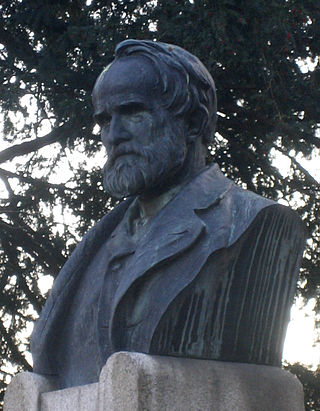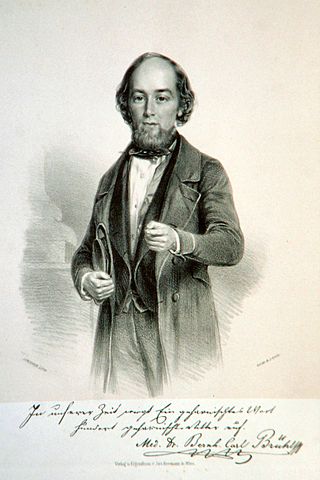
A hammer mill, hammer forge or hammer works was a workshop in the pre-industrial era that was typically used to manufacture semi-finished, wrought iron products or, sometimes, finished agricultural or mining tools, or military weapons. The feature that gave its name to these workshops was the water-driven trip hammer, or set of hammers, used in the process. The shaft, or 'helve', of the hammer was pivoted in the middle and the hammer head was lifted by the action of cams set on a rotating camshaft that periodically depressed the end of the shaft. As it rose and fell, the head of the hammer described an arc. The face of the hammer was made of iron for durability.

"The Pledge" is a ballad published by the German poet Friedrich Schiller in his 1799 Musen-Almanach. He took the idea out of the ancient legend of Damon and Pythias issuing from the Latin Fabulae by Gaius Julius Hyginus, as rendered in the medieval collection of the Gesta Romanorum. It magnifies the belief in fidelity and loving friendship, and remains today one of the most famous German poems.

Brachttal is a municipality in the Main-Kinzig district, in Frankfurt Rhine-Main in Hesse, Germany.

Johann Georg Fischer was a German poet and playwright.

The Man Who Was Sherlock Holmes is a 1937 German mystery comedy film directed by Karl Hartl and starring Hans Albers, Heinz Rühmann and Marieluise Claudius.

Petra Seeger is a German documentary film director and producer. Her 2008 documentary film, In Search of Memory: The Neuroscientist Eric Kandel explores the life of Eric Kandel, a Nobel Prize winning Austrian neuroscientist whose research focused on learning and memory.
"The Battle with the Dragon" is a 300-verse ballad by Friedrich Schiller, divided into 25 stanzas of 12 verses each.
"The Veiled Image at Sais" is a 1795 ballad by Friedrich Schiller using ancient Greek, Egyptian and biblical motifs.

"Der Handschuh" is a ballad by Friedrich Schiller, written in 1797, the year of his friendly ballad competition with Goethe. Other ballads written that year include Schiller's "Der Gang nach dem Eisenhammer", "Die Kraniche des Ibykus", "Der Ring des Polykrates", "Ritter Toggenburg", "Der Taucher", and Goethe's "Die Braut von Korinth", "Der Gott und die Bajadere", "Der Schatzgräber (Goethe)", "The Sorcerer's Apprentice".
"Der Taucher" is a ballad by Friedrich Schiller, written in 1797, the year of his friendly ballad competition with Goethe.

Der Handschuh is a composition by Graham Waterhouse. He wrote the setting of Friedrich Schiller's ballad for cello and speaking voice in 2005. It was published in 2007 in Heinrichshofen's Verlag.

Carl-Bernhard Brühl was an Austrian physician and anatomist known for his work in the field of comparative osteology.
Valdštejn is a Czech-language opera in six scenes by Jaromir Weinberger to a libretto by Miloš Kareš after Friedrich Schiller's Wallensteins Lager. The libretto was translated back into German by Max Brod for 1937 performance in Vienna. The opera was performed in Vienna at the new Modernes Theater on the Schwarzenbergplatz, a year before the Anschluss and the composer's escape to America.
Maria Lauber was a Swiss writer, who published both in Standard German and in the local dialect of Swiss German.
Gerhard Storz was the son of a Lutheran pastor from Württemberg who at various stages distinguished himself in theatre productions, as a scholar, an educationalist, a politician and an author-journalist, sometimes pursuing one career at a time and sometimes several in combination. Throughout his adult life he liked to see himself as a "language therapist". "Human speech seems to have been encoded, sealed into formulaic structures, and pressed into service for mechanistic operations", he once wrote.
Johann Heinrich Andreas Vohs was a German actor and singer.
Johann Baptist Klerr was an Austrian Kapellmeister and composer.

Franz Ignaz von Holbein was an Austrian playwright and theatre director.

Summer in Berlin is the eleventh studio album of the music project Schiller, created by the German electronic musician Christopher von Deylen. The album was released on 12 February 2021. On this album Schiller has collaborated with the singers Tricia McTeague and Janet Devlin, the musician Quaeschning from Tangerine Dream and the music group Alphaville. It will be released in different editions, including the limited "Super Deluxe Edition".

Balladenjahr refers to the year 1797 in the history of German literature, in which many of the best-known ballads of Johann Wolfgang von Goethe and Friedrich Schiller originated within a few months, such as Goethe's "Der Zauberlehrling" and Schiller's "Der Ring des Polykrates", "Der Taucher", "Der Handschuh", "Der Gang nach dem Eisenhammer", "Ritter Toggenburg", and "Die Kraniche des Ibykus".











